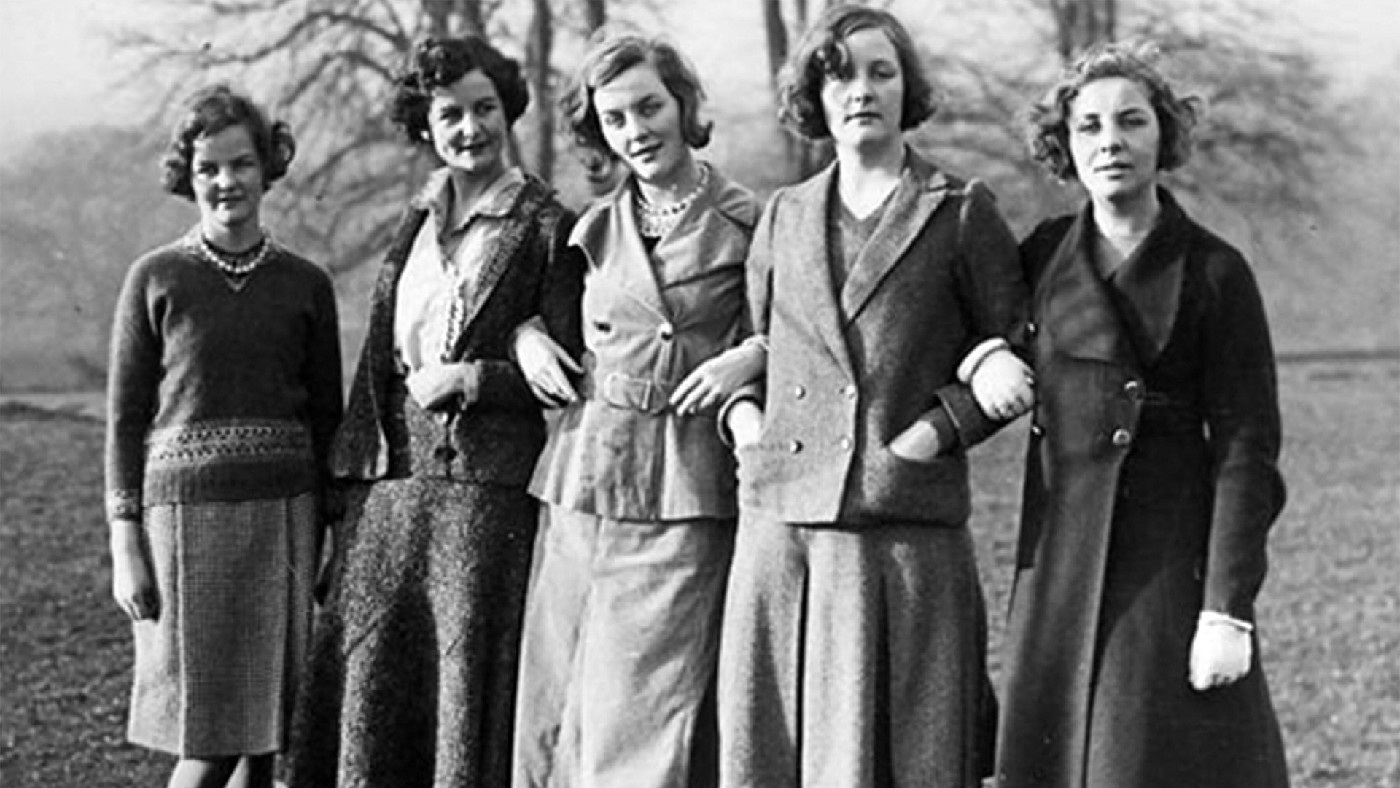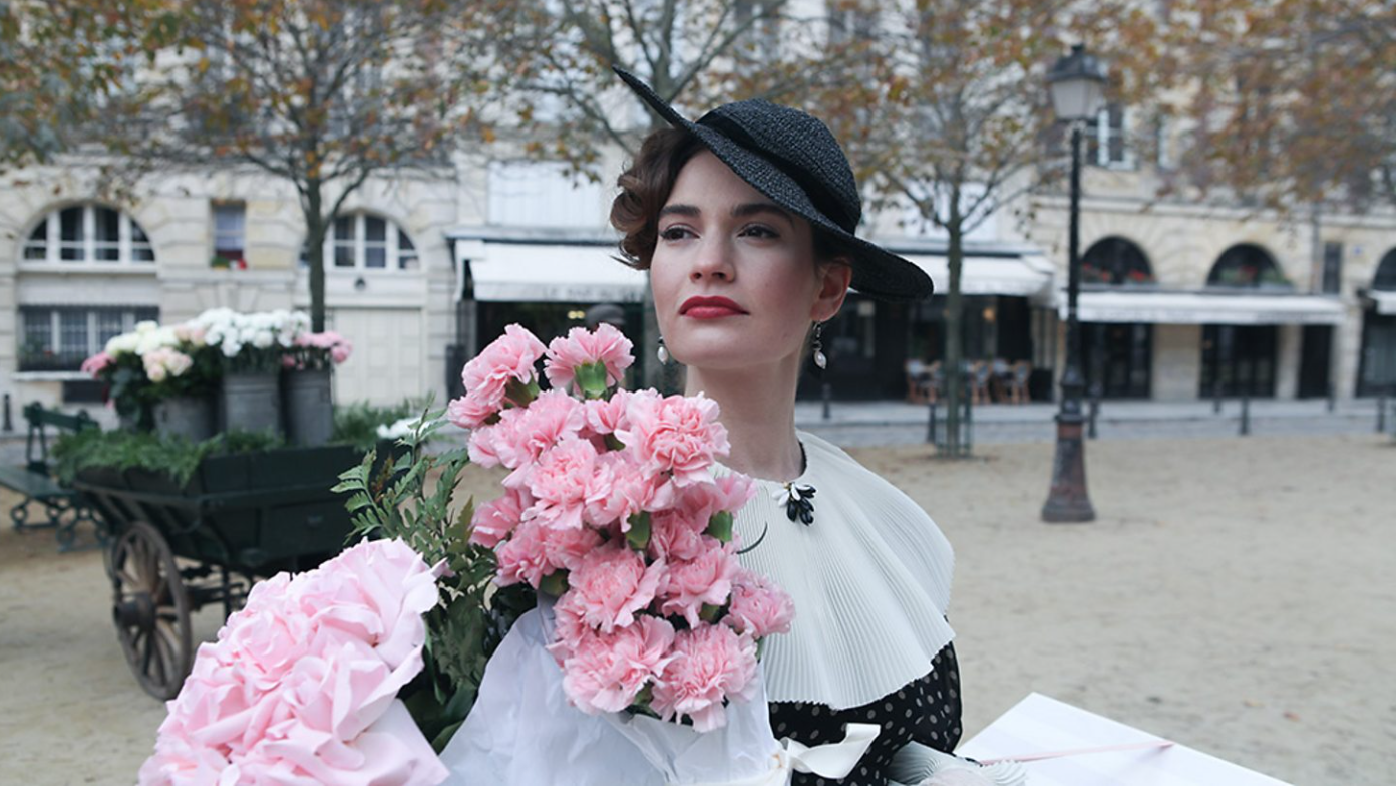The Mitfords: the Kardashians of their day
Nancy Mitford’s comic novel The Pursuit of Love, newly adapted for the BBC, mythologised her family as a group of adorable oddballs. But what was the true story behind it? Iona McLaren investigates

A free daily email with the biggest news stories of the day – and the best features from TheWeek.com
You are now subscribed
Your newsletter sign-up was successful
“My dear Lady Kroesig, I have only ever read one book in my life, and that is White Fang. It’s so frightfully good I’ve never bothered to read another.” So says Uncle Matthew in Nancy Mitford’s The Pursuit of Love, a glossy new adaptation of which aired on BBC1 this month, with Lily James as Linda Radlett (Nancy’s alter ego), and Dominic West as Uncle Matthew, the “wicked lord of fiction”, who hunts his children on horseback with bloodhounds, and takes tea under the entrenching tool, (still covered with blood and hairs), with which he “whacked to death eight Germans as they crawled out of a dug-out” in 1915.
As in art, so in life. The real Uncle Matthew was Nancy’s father, Lord Redesdale, progenitor of the much-written-about Mitford brood: Diana, the fascist; Unity, the even more fascist; Jessica, the communist; Deborah, the duchess; Tom, the forgotten-but-also-fascist son; Nancy, the novelist; and Pam, the housewife. (It is worth noting that Pam – who spent much of her childhood impersonating a horse, became John Betjeman’s muse, married a bisexual and then, late in life, settled down as a lesbian – is still agreed to be the “boring” one.)
In The Pursuit of Love (1945) and its sequel Love in a Cold Climate (1949), they become the Radletts, a feral pack of aristocratic imps who, “had they been poor children... would probably have been removed from their roaring, raging, whacking papa and sent to an approved home”. These comic novels are nostalgic, but not fluffy: people don’t associate Nancy Mitford with acne, abortion, paedophilia and incest, yet it’s all there. And Redesdale, as “that ogre” Uncle Matthew, is the novels’ star – which, since he was a committed bibliophobe, is ironic.
The Week
Escape your echo chamber. Get the facts behind the news, plus analysis from multiple perspectives.

Sign up for The Week's Free Newsletters
From our morning news briefing to a weekly Good News Newsletter, get the best of The Week delivered directly to your inbox.
From our morning news briefing to a weekly Good News Newsletter, get the best of The Week delivered directly to your inbox.
In the early days of their marriage, the Mitfords’ mother Sydney had persuaded him to broaden his horizons beyond White Fang, and lent him Tess of the d’Urbervilles, because she thought he might like the bits about farming. As Jessica recounts in her memoir, Hons and Rebels, Sydney came in to find him sobbing uncontrollably. “Oh, darling, don’t cry, it’s only a story,” she said. “‘WHAT,’ said my father, sorrow turning to rage, ‘do you mean to say that damn feller made it up?’”
His views on fiction warmed considerably when he started appearing in Nancy’s. It was in Highland Fling (1931) that he made his debut, as General Murgatroyd, “a man of violent temper” who whips dogs and roars (in Redesdale’s argot) “Damn sewer!” and “Stinks to merry hell!” Redesdale was far from offended. On the contrary, wrote Jessica, he “rather loved being General Murgatroyd… Farve became – almost overnight – more of a character of fiction than of real life, an almost legendary figure, even to us. Now that he had been classified, so to speak, his Murgatroydish aspects began to lose some of their dread, even to take on some of the qualities of raw material for fiction.”

The Pursuit of Love and Love in a Cold Climate, with Murgatroyd now evolved into Uncle Matthew, were instant classics. But Redesdale, who never had a strong grip on the distinction between real and make-believe, treated them as straight portraits of himself, offering corrections: “Never got the stock whips in Canada”; “You can’t fuddle chub in Feb”. As the decades went by, Nancy “continued to perfect the process of capturing him and imprisoning him between the covers of novels”, as Jessica put it, erasing his prior existence so completely even his obituarist called him “the explosive, forthright Uncle Matthew”.
Captured, imprisoned: there’s a touch of sadism here. Diana spoke of Nancy’s “will to power”, and as a friend of Hitler, she presumably knew what she was talking about. The whole Mitford family succumbed, in various ways, to Nancy’s forceful mythology. We might now call it “structured reality” – having to live with someone else’s narrative vision relentlessly imposed upon you, and offered up, Kardashian-like, for public delectation. And the public were ravenous for it. “Whenever I see the words ‘peer’s daughter’ in a headline... I know it’s going to be something about one of you,” their mother told them.
A free daily email with the biggest news stories of the day – and the best features from TheWeek.com
For better or worse, it was Nancy who had made the Mitfords, on and off the page. As Deborah said, she “saw people and situations as no one else did, and could turn the serious into the ridiculous”. Without their eldest sister, and her ceaseless, often unkind teases (like calling Unity, Jessica and Deborah “NIT SIC AND BOR” after the middle letters of their names) and her genius for transmuting life’s banalities into “shrieks” and “screams” – which is to say jokes – they might have been a more normal family. “Everything sprang full-blown from Nancy,” said Jessica.
Inevitably, there were winners and losers in this game. In The Pursuit of Love, Sydney, a noted eccentric, becomes “vague” Aunt Sadie (played by Dolly Wells in the new series, adapted by Emily Mortimer, who makes a cameo as Sadie’s sister, “The Bolter”). “I don’t mind what you write about me when I am dead,” Sydney told Nancy, “but I do dislike seeing my mad portrait while I am still alive.”
Arguably, Sydney got off lightly. This is a woman who said, of the 1938 Nuremberg rally: “How sensible it is of H[itler] to put all Germans into uniforms, as they have such terrible other clothes.” Diana, who in 1932 had fallen for the British fascist Sir Oswald Mosley, had persuaded the Redesdales to overcome their antipathy to the “Hun” (“Farve is one of nature’s Born Fascists,” said Diana) and tour Nazi Germany. They were impressed. Unity, of course, was already there, dreaming of life as “the Hon Mrs Adolf Hitler”, as her biographer put it. When war was declared, Lord Redesdale publicly renounced the Nazis, Unity shot herself in the head, and Sydney, maddened with grief, or perhaps just mad, remained pro-Hitler (“he has very good manners”).

But, of course, you won’t read any of this in Nancy’s novels. So successful have they been at imposing their version of Mitford reality, that readers now take them for memoir-in-code. The truth is that they are wishful thinking on a heartbreakingly grand scale.
In 1945, when Nancy wrote the book that made the world fall in love with her family, that family was in tatters: Diana under house arrest, Unity brain-damaged, Tom dead in Burma, Jessica starting from scratch in America. Her parents had separated. Nancy, after an ectopic pregnancy, had woken up on the surgeon’s table to be told she was barren. (“Ovaries – I thought one had 700, like caviar,” was her mother’s response.) She had no money; her marriage to the unfaithful Peter Rodd – whom her father called “the bore” – was over. Working in a Mayfair bookshop, she was asked to suggest a book for the Duke of Beaufort: “He NEVER reads you know. If somebody could write a book for people who never read they would make a fortune.” So she did.
Why not, she must have thought, go back to that cosy mythical pre-political time when the Mitfords all ran as a pack? In fact, why not rewrite herself – the raven-haired changeling in a blonde family – as the “great beauty” of a brunette one? And why not lend the Mitfords the stable grandeur of the Radletts at Alconleigh, their “large, ugly, north-facing, Georgian house... as grim and bare as a barracks”. Nancy was, offhandedly, running down something she longed to have. She had been born in a small London house, and thereafter “we lived under the shadow of two hammers: that of the builder and that of the auctioneer”. Her father eventually quartered the family in Swinbrook, a ruinously expensive new-build, “some lesser Nazi’s vision of a Cotswold manor house”, as Nancy put it, which she nicknamed Swinebrook. There, the children slept in whitewashed cells and found their sponges frozen over each morning.
The only warm place was an airing cupboard, known as the “Hons Cupboard”, where the children (all “Honourables” because their father was a lord) met to plot “war on the terrible Counter-Hons”. This detail makes it into The Pursuit of Love, which Nancy’s left-wing friends, like Cyril Connolly, found particularly obnoxious. But the Mitfords were never meant to be Hons – their father only became a lord by accident, when his brother was killed in the Great War. Nancy was, as her biographer Laura Thompson put it, “intrigued by the question of what constitutes an aristocrat because she was only one herself by the skin of her pointed little teeth”. The fictional Linda does not have an easy time in love, but in real life Nancy had it far worse. The feckless, fey and undoubtedly gay Hamish St. Clair-Erskine strung her along for years; when he finally let her down, she attempted suicide – like Linda, who eats a basket of yewberries to rejoin a lost labrador – except Nancy put her head in the oven. Then she went “back to bed and was sick”.
On the rebound, at 29, she married Rodd, whose two unlovely sides were portrayed in The Pursuit of Love, as Selina Hastings noted, in Linda’s two husbands: the bore Tony Kroesig, his head full of “a vast quantity of utterly empty fact”, and the ideologue Christian, “so detached from other human beings he hardly notices whether they are there”. For Linda, it takes a Frenchman, Fabrice, Duc de Sauveterre, to show her real love. For Nancy, it was Colonel Gaston Palewski, de Gaulle’s chef de cabinet in London.
Palewski, a Frenchman of Polish extraction, was one of those charmers who, as a friend put it, “could talk away their face” in half an hour with a pretty girl, which was fortunate because he had, in Thompson’s words, “a face like a King Edward potato”. But it is thanks to Nancy’s intoxication with Palewski that The Pursuit of Love is suffused with a magical benevolence entirely lacking in her cynical, forgettable earlier novels. He, however, was embarrassed by the book – the French press making hay with “Hitler’s Mistress’s Sister dedicates daring book to M Palewski”.
In The Pursuit of Love, Fabrice tells Linda he loves her and wants to marry her. Nancy, on the other hand, would wait and wait, abasing herself, for “the Col’s” affection. She moved to the same street in Paris; her grey-enveloped letters were so frequent he nicknamed them an “avalanche grise”. “I know one’s not allowed to say it but I love you,” she wrote. After a quarter of a century, in 1969, he said he was marrying another mistress: the Duchesse de Sagan. What a smack in the face for the nearly-not-Hon Nancy Mitford.
No more than she deserved, some say. Is Mitford fever – this unhealthy obsession with a clutch of backward girls, mostly either snobs, or Nazis, or both – something Britain will ever grow out of? There is no question over whether Nancy was a snob. Her notorious 1954 article on “U and non-U” English (“napkin or serviette?”) was, she protested, meant as “a volley of teases”, but it was not a one-off; her novels, too, enjoy their “delicate fingering of fraught middle-class nerves”, as Thompson calls it.
If that cruel streak were all there was to Nancy, she’d belong in the bin. But The Pursuit of Love and Love in a Cold Climate are really about the secret of living intensely. “The Radletts were always either on a peak of happiness or drowning in black waters of despair; their emotions were on no ordinary plane, they loved or they loathed... they lived in a world of superlatives.” The barrier to entry is low: Radletts take joy in newspaper headlines (“Man’s long agony in a lift-shaft”) or Fuller’s walnut cake.
The Mitfords are mistakenly thought to embody Englishness, but even though they could only have happened here, they were, in their carelessness of convention, quite alien. And so Nancy’s novels, with their quivering joie de vivre, still have something important to teach the English – who “as a nation, take their pleasures sadly”. As Deborah wrote: “Nancy made me laugh and cry equally, but what I remember now is the laughter.”
A longer version of this article appeared in The Daily Telegraph. © Iona McLaren/Telegraph Media Group Ltd